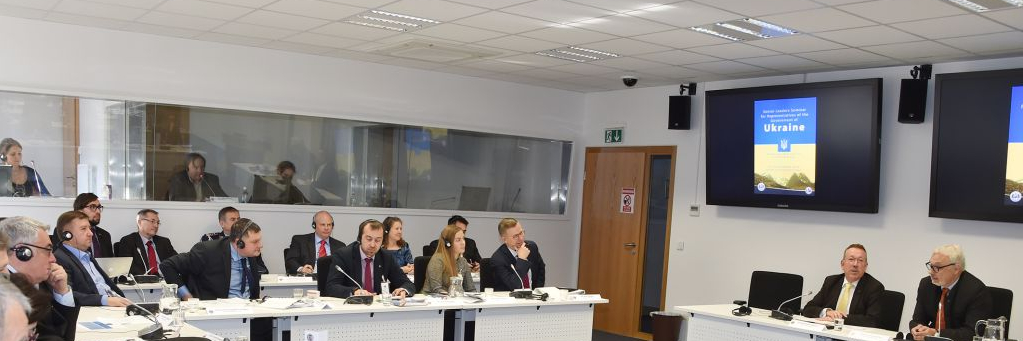
Fifth Ukraine Senior Leader Seminar Examines Democratic Oversight of the Armed Forces
By James E. Brooks
Public Affairs Office
George C. Marshall European Center for Security Studies
GARMISCH-PARTENKIRCHEN, Germany (Nov. 16, 2016) – The George C. Marshall European Center for Strategic Studies guided Ukrainian parliamentarians and senior military officers of the General Staff towards defense reform at a senior leader seminar held at the center Nov. 14-16.
This was the fifth senior leader seminar organized by the U.S.-German partnership over the past two years.
“One of the very successful seminars was held in Kyiv last March in collaboration with the Parliament Supreme Rada of Ukraine, while the others have taken place here in Garmisch. This event’s focus was on “Democratic Oversight of the Armed Forces”, which is one of the many challenges that Ukraine is facing. Bringing Ukrainian senior leaders together gives them opportunities to gain momentum for vital reforms in civil-military relations and democratic civilian oversight of the defense and security sector as well as inter agency cooperation,” said Marshall Center Program Director for Black Sea and Eurasia Valbona Zeneli. “Our aim is to create an environment conducive to trust and confidence building for parliamentarians and military officials in Ukraine, as the best way to ensure effective governmental reforms and civil-military relations for the best interests of Ukraine.”
Deputy Chief of Mission at the U.S. Embassy Kyiv George Kent spoke to the Ukrainian leaders about the urgency of defense and security reforms. Seminars like this organized by the Germany and the United States through the unique Marshall Center partnership play an important part in guiding Ukraine towards reform.
“The parliamentarians themselves were joking that ‘it took them to all come to Garmisch to get all the important stakeholders around the table to talk to each other,” said Kent. “This conference was noteworthy because members of the general staff including two general officers engaged parliamentarians arguably for the first time. The deputy speaker said herself that the general staff has not come to testify or discuss in parliament. This is a great example of Marshall Center using its convening power to bring stakeholders together and, at times, have a passionate, very heated conversation about issues they all agree are needed,” said Kent.
The two-day seminar was divided into eight sessions focused on different perspectives on civilian control of the military as practiced by the seminar host nations, Germany and the United States. U.S. Army’s Principal Deputy Chief Legislative Liaison Bernard Ingold shared the American perspective of civilian oversight while German Gen. (ret.) Rainer Schuwirth offered best practices from the German perspective. Commander, U.S. Army Europe Lt. Gen. Ben Hodges shared his thoughts on civil-military relations from the perspective of a senior U.S. military leader. German parliamentarian Karl Heinz Brunner spoke on his nation’s experience with democratic control of their “Bundeswehr.” Other presentations and discussions were led by NATO, EU, and defense advisors.
“Having the Ukraine general staff involved with conversations with stakeholders is critically important. I think the final session of conversations showed we still have a lot of work to do to get stakeholder buy-in to get to the point where the law can be presented and considered,” said Kent. “The key thing is to keep trying to get the Ukrainian stakeholders to communicate.”
Before the parliamentarians and senior officers left Garmisch to return home, Marshall Center Director U.S. Army Lt. Gen. (ret.) Keith Dayton told them the center has a close relationship with their nation. Ukraine has the largest number of Marshall Center alumni and seminars like this one are designed to help the reform process.
“If our intent was to generate discussion, we did it. Think about who we had here. You had international advisors, Ukrainian presidential administration staff, minister of defense staff, general staff, parliament, representatives of US and German embassies….this is a pretty rich group. The task in front of you is a very serious one. All of you are in responsible positions in your country and all of you have a choice to make. The choice is about the future of Ukraine. We believe we’ve had some successes over the past two years doing these seminars. I have high hopes this seminar will build on that success,” said Dayton.
